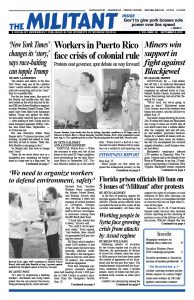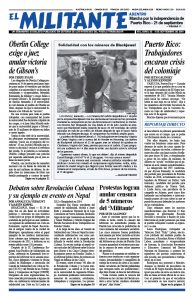Following months of airstrikes by the Syrian regime and its ally in Moscow, the government of Bashar al-Assad has retaken some key areas in Idlib province that have been under the control of opponents of his dictatorial rule for the past five years. The bombardments exacerbated the disastrous conditions for some 3 million people, many of whom had fled government army assaults in other parts of Syria.
Conflicts are sharpening among the rival capitalist governments intervening in Syria. The governments of Russia and Iran back the efforts of Bashar al-Assad to reimpose his control over the country; Turkish rulers have sent troops to intervene in northern Syria, backed armed groups fighting Assad and sought to deal blows to Syrian Kurds fighting for their national rights; and the Israeli rulers are stepping up their airstrikes on bases that Tehran has established inside Syria.
Washington, with about 1,000 troops in northeastern Syria in areas controlled by Kurdish-led Syrian Democratic Forces, seeks to defend its imperialist interests and counter the Iranian government’s military presence and political influence in the country.
Syrian government troops captured the strategic town of Khan Sheikhoun and surrounding areas in Idlib Aug. 20. Hayat Tahrir al-Sham, a reactionary Islamist group which had been administering the area since January, fled after days of heavy fighting. Militias backed by the Iranian rulers reinforced Moscow’s airstrikes on the area.
Khan Sheikhoun lies along the main road connecting Damascus and Aleppo, two of Syria’s biggest cities under government control.
A “de-escalation” agreement between the governments of Iran, Russia and Turkey over fighting in Idlib in 2017 permitted the establishment of Turkish troops at 12 military outposts in and around the province aimed at protecting opposition forces that the Turkish government backs. The pact also demanded that all Islamist groups relinquish heavy arms and leave the area. When they didn’t comply with the commands of Moscow and Assad, the Russian government unleashed massive airstrikes in the area.
Syrian warplanes fired at a Turkish military post in the village of Morek Aug. 22. Days earlier airstrikes had targeted a Turkish army convoy, killing three civilians and wounding 12. In response, the Turkish government sent additional armored vehicles and troops to its outposts in Idlib, Anadolu Agency reported.
These attacks “could test the strength of military cooperation between Turkey and Russia,” noted the Wall Street Journal. The Turkish government recently began receiving S-400 antiaircraft missile equipment from Moscow, provoking the ire of Washington, its NATO “ally.”
Since late April, airstrikes and rocket fire have killed more than 700 civilians in Idlib, according to the United Nations. Hundreds of others have been wounded.
Over the past three months more than half a million people have fled their homes, camping along roads, in olive groves and orchards near the Turkish border. Many face dire conditions without tents or shelter from the summer heat. Since 2016 the Turkish government has shut its border to Syrian refugees trying to enter the country.
The eight-year-long civil war in Syria has killed hundreds of thousands of people and displaced more than 10 million. It followed a powerful uprising by working people who fought to overturn Assad’s repressive rule in 2011. He crushed their rebellion, but different opposition forces, including Islamist groups, took up arms and seized control of large parts of the country.
Turkish gov’t targets Syrian refugees
During the civil war, some 3.6 million people from Syria have taken refuge in Turkey. They are required to register in the Turkish province where they reside. While many live in areas bordering Syria, hundreds of thousands of others have moved to Istanbul, Turkey’s largest city, in search of work.
Turkish authorities have stepped up the arrest of Syrian immigrants “during raids on homes or workplaces, as well as during ID checks in the streets,” reported Al Jazeera. In Istanbul alone thousands have been detained in recent weeks. The Turkish government demands the 350,000 Syrian immigrants living in Istanbul who are registered in other cities must return there by Oct. 30.
It disputes claims by human rights groups that it is deporting Syrians back to war-torn areas of the country, claiming that those who are leaving Turkey do so “voluntarily.” However the “voluntary return document,” that cops press refugees to sign is written in Turkish, a language that many Syrians can’t read.

